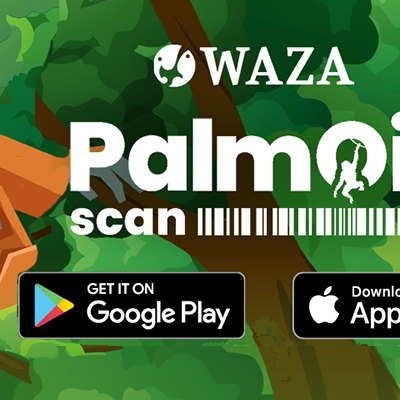PALMOIL SCAN APPTM NOW AVAILABLE FOR CONSCIENTIOUS CONSUMERS IN AUSTRALIA AND NEW ZEALAND – Auckland Zoo and Zoos South Australia are the latest zoos joining Cheyenne Mountain Zoo (CMZoo) on a worldwide effort, led by the World Association of Zoos and Aquariums (WAZA), to empower consumers to advocate for wildlife with their shopping choices.
Smart shoppers can save the rainforests from the comfort of their smartphones with a free global mobile app called PalmOil Scan, available for free on the App Store and Google Play. It launched last year in the United States, Canada and United Kingdom – and is now available in Australia and New Zealand.
Zoos are stepping up to the task of managing the app’s shopping product database for consumers in different regions. Americans and Canadians lean on the support of Cheyenne Mountain Zoo. In the United Kingdom, it’s Chester Zoo. In Australia, Zoos South Australia is keeping the app going. In New Zealand, Auckland Zoo is in charge. So, no matter the longitude or latitude, consumers can easily make brand shopping choices that help wildlife and wild places.
“We’re excited to welcome Zoos South Australia and Auckland Zoo to the team managing the app,” said Tracey Gazibara, executive vice president at CMZoo and co-chair of the WAZA Palm Oil Subcommittee. “Now, on nearly half of the world’s continents, people have the power to advocate for animals with their shopping choices, and to make large companies listen to their demands for products made with sustainably produced palm oil.”
Palm oil is an edible oil that can be found in about half of the products consumers purchase. It is used in candy, soaps, cosmetics, pet food and even toilet paper. Because of high demand, unsustainable palm oil production has resulted in deforestation across Southeast Asia, and other tropical areas, which means critically endangered species like orangutans, tigers and elephants are losing their homes.
However, when produced sustainably, palm oil is the most productive edible oil available. Oil palms – the trees that palm oil comes from – produce four to ten times more oil than alternatives like soy, olive, canola and coconut. Switching to these alternatives would cause even more deforestation in tropical areas, which is why consumers must demand sustainable palm oil.
Using PalmOil Scan, conscientious consumers can scan the barcodes on tens of thousands of products in the app’s extensive database (which is being updated and expanded continually) to see if they are produced by a company that has committed to sourcing sustainable palm oil. The free app also has a search feature, so if consumers scan a product that isn’t orangutan-friendly, they can easily choose an alternative that is.
Companies that have previously relied on their customers’ lack of knowledge about unsustainable palm oil and its impact on orangutans, tigers, rhinos, and elephants will soon recognize their competitors have the edge on them.
“Companies that continue to use unsustainable palm oil in their products need to see that consumers have the tools and knowledge to find out whether they value the habitats that so many endangered species depend on,” said Gazibara. “Sustainable palm oil production is possible, and it is time for us all to hold companies to a higher standard.”
CMZoo supporters won’t be surprised to hear the Zoo is continuing its palm oil advocacy work. CMZoo has been a leader in sustainable palm oil advocacy for more than a decade. Under the direction of WAZA, CMZoo helped launch PalmOil Scan, in July 2022. The Zoo launched a similar mobile app for consumers in the U.S. and Canada in 2014. More than 160,000 verified users educated themselves by using CMZoo’s app. Its design, database and user experience served as the foundation for the design of PalmOil Scan, which has the potential to reach millions more people around the world.
“If worldwide consumers show preference for companies that source only sustainable palm oil, we can create a demand that other companies can’t ignore,” said Gazibara. “When more companies realize their potential customers will not stand for the use of unsustainable palm oil, we can prevent more deforestation and help endangered animals recover in the wild.”
To learn more about sustainable palm oil, and how the power of consumer choice can save critically endangered animals in Southeast Asia, visit cmzoo.org/palmoil.

